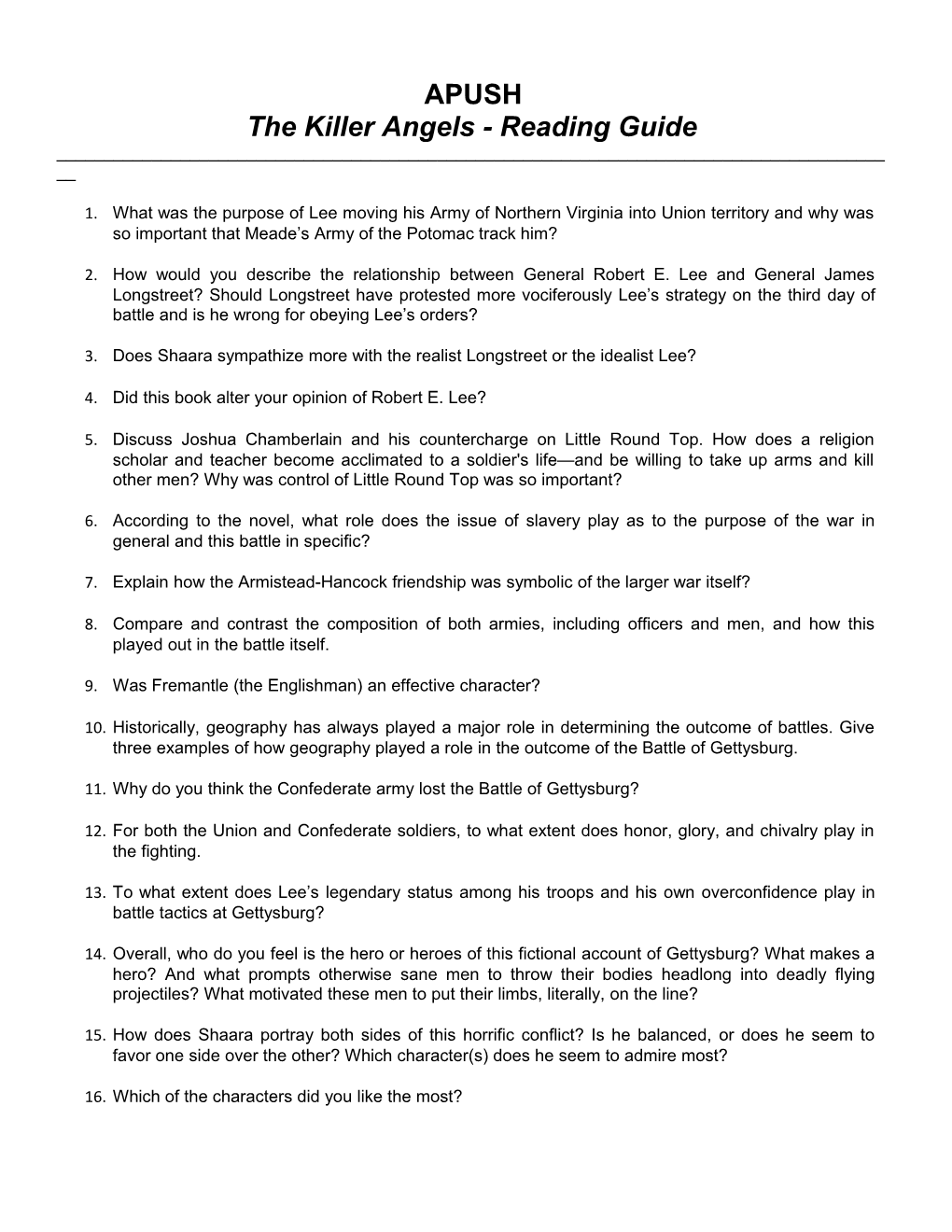APUSH
The Killer Angels - Reading Guide
______
- What was the purpose of Lee moving his Army of Northern Virginia into Union territory and why was so important that Meade’s Army of the Potomac track him?
- How would you describe the relationship between General Robert E. Lee and General James Longstreet? Should Longstreet have protested more vociferously Lee’s strategy on the third day of battle and is he wrong for obeying Lee’s orders?
- Does Shaara sympathize more with the realist Longstreet or the idealist Lee?
- Did this book alter your opinion of Robert E. Lee?
- Discuss Joshua Chamberlain and his countercharge on Little Round Top. How does a religion scholar and teacher become acclimated to a soldier's life—and be willing to take up arms and kill other men? Why was control of Little Round Top was so important?
- According to the novel, what role does the issue of slavery play as to the purpose of the war in general and this battle in specific?
- Explain how the Armistead-Hancock friendship was symbolic of the larger war itself?
- Compare and contrast the composition of both armies, including officers and men, and how this played out in the battle itself.
- Was Fremantle (the Englishman) an effective character?
- Historically, geography has always played a major role in determining the outcome of battles. Give three examples of how geography played a role in the outcome of the Battle of Gettysburg.
- Why do you think the Confederate army lost the Battle of Gettysburg?
- For both the Union and Confederate soldiers, to what extent does honor, glory, and chivalry play in the fighting.
- To what extent does Lee’s legendary status among his troops and his own overconfidence play in battle tactics at Gettysburg?
- Overall, who do you feel is the hero or heroes of this fictional account of Gettysburg? What makes a hero? And what prompts otherwise sane men to throw their bodies headlong into deadly flying projectiles? What motivated these men to put their limbs, literally, on the line?
- How does Shaara portray both sides of this horrific conflict? Is he balanced, or does he seem to favor one side over the other? Which character(s) does he seem to admire most?
- Which of the characters did you like the most?
- I found the following passage particularly effective at putting me on the battlefield (p. 329-330). Are there passages or images that made an impact on you?
[Chamberlain] became aware for the first time of the incredible variety of sound. The great roar was composed of a thousand different rips and whispers, most incredible noise he had ever heard or imagined, like a great orchestra of death: the whicker whicker of certain shells, the weird thin scream of others, the truly frightful sound made by one strange species that came every few moments, an incredible keening, like old Death as a woman gone mad and a-hunting you, screaming, that would be the Whitworth, new English cannon the Rebs had. Then there were the sounds of the bursts, flat splats in the air, deeper bursts in ground, brutal smash and crack of shot into rock, shot splattering dirt and whining off, whispers of rock fragments and dirt fragments and small bits of metal and horse and man rippling the air, spraying the ground, humming the air, and the Union cannon braying away one after another, and an occasional scream, sometimes even joy, some of the cannoneers screaming with joy at hitting something as when they saw a caisson blow up across the way.
- What are the advantages and disadvantages of Shaara’s switching point of views? Could this book have worked from a limited third person point of view? First person?
- From your reading of The Killer Angels, what do you think was the main reason the Civil War was fought?
- Are there questions you would like to ask?
- Did you like the book? Why or why not?
